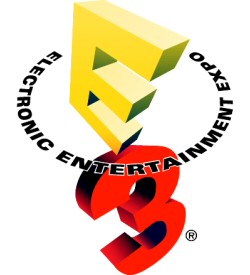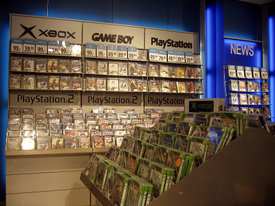Since nearly all computer games use some sort of visual display, these terms are usually considered interchangeable, and are frequently used as umbrella terms for interactive game software. The phrase interactive entertainment is the formal reference to computer and video games. To avoid ambiguity, this game software is referred to as "computer and video games" throughout this article.
However, in common usage, "computer game" refers more specifically to games played on a personal computer, while "video game" (or "videogame") actually refers to both, and " game" refers specifically to games played on a particular console.
- For specific information regarding "computer games", see personal computer game.
- For specific information regarding "console games", see console game.
History
The first primitive computer and video games were developed in the 1950s and 1960s and ran on platforms such as oscilloscopes, university mainframes and EDSAC computers. Arcade games were developed in the 1970s and led to the so-called "Golden Age of Arcade Games". One of the most well-known of these games is Pong.
The 1970s also saw the release of the first home video game consoles. The late 1970s to early 1980s brought about the improvement of home consoles and the release of the Atari 2600, Intellivision and Colecovision. The video game crash of 1983, however, produced a dark age in the market that was not filled until the Nintendo Entertainment System (NES) reached North America in 1985. The last two decades of game history have been marked by separate markets for games on video game consoles, home computers and handhelds. See the article on Console wars for additional information on that facet of game history.
The future of console gaming
The end of 2005 and first and second quarters of 2006 will see the next generation of console gaming in the form of continuing advances in processor technology, graphics technology, design innovation, and even platform specific gaming community infrastructure. Sony, Nintendo, and Microsoft are all participating in this coming year's "technology race". The second generation Microsoft offering, the Xbox 360, will be powered by a multi-core CPU, the PlayStation 3 will be powered by Cell processor technology, and the Nintendo Revolution will allow the gamer to interact with the game via a wireless motion sensing controller, although full technical specifications are yet to be revealed.
Gameplay
In computer and video gaming, gameplay (sometimes called "Game mechanics") is a general term that describes player interaction with a game. It includes direct interaction, such as controls and interface, but also design aspects of the game, such as levels.
Although the use of this term is often disputed, as it is considered too vague for the range of concepts it describes, it is currently the most commonly used and accepted term for this purpose when describing video games.
Genres
Games, like most other forms of media, may be categorized into genres based on gameplay, atmosphere, and various other factors. Most include Genres like RPG (role playing game), First person shooter, action, MMORPG (massively multiplayer online role playing game) ... etc.
Any individual gamer is likely to favor some types of gameplay over others, these are refered to as video game genres. The most common genres in use today include platformers, adventure, role-playing games (RPGs), first person shooters (FPS), third person shooter (sometimes called shoot 'em ups), sports, racing, fighting (sometimes called beat 'em ups), action (although this term is abused), puzzle, simulation, and real time strategy (RTS), to name a few. It is rare that a game will fall purely into one genre, most games are a combination of two or more genres (e.g action/RPG). Although most genres have 2D counterparts, they are for the most part considered entirely different genres because of the differences in the way 2D and 3D games are played (e.g. Super Mario Bros. and Super Mario 64).
The increase in the popularity of online gaming has also resulted in new sub-genres being formed, such as the massively multiplayer online role-playing game.
Gaming platforms
Today there are many different devices that games may be played on. Personal computers, consoles, handheld systems, and arcade machines are all common. There is difference between games played on the computer and those on the console, which is a uncustomizable computer with little or no setup or maintenance required, and without the upgrade capability.
Many games intended for computer are now just as prevalent on consoles, both of which have many of the same titles. This is due to the fact that video game consoles have drastically increased in computing power and capabilities over the last few years to the point that they can handle games that were formerly only playable with comparatively higher-end computers. During the last generation of gaming, most major computer game releases have coincided with the release of console versions, and titles initially developed for a single platform are often ported to others if they prove to be successful.
Personal Computer
Personal computer games are commonly referred to as "computer games" or "PC games". They are played on the personal computer with standard computer interface devices such as the keyboard and mouse, or additional peripherals, such as joysticks. Video feedback is received by the user through the computer screen, sound through speakers or headphones. Computer games are often more powerful than console games because of early market releases of their external architecture and graphics cards.
The most popular genres of Computer games are First-Person Shooters, Real-Time Strategy, Simulations, and MMOGs, given the long-standing nature of Internet access and online play. First Person Shooters benefit highly from using the keyboard and mouse to give very fine control over player movement that is still not matched on the consoles.
Read more at Wikipedia.org




